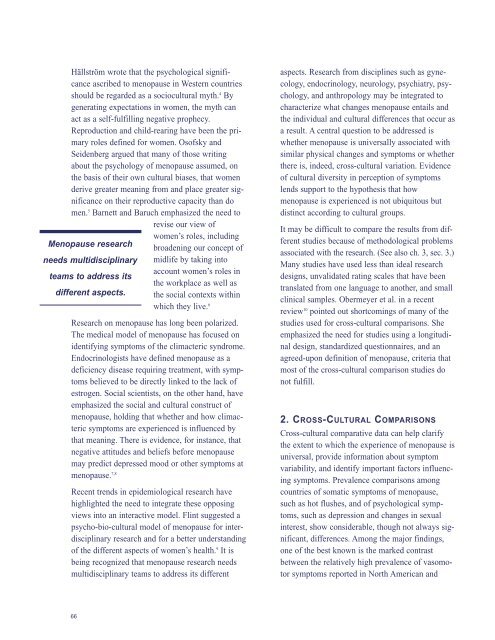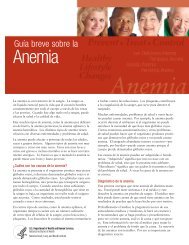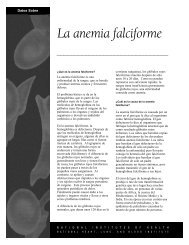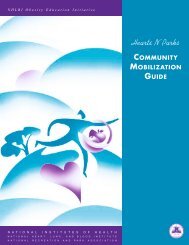WOMEN 'S HEALTH AND MENOPAUSE : - National Heart, Lung ...
WOMEN 'S HEALTH AND MENOPAUSE : - National Heart, Lung ...
WOMEN 'S HEALTH AND MENOPAUSE : - National Heart, Lung ...
You also want an ePaper? Increase the reach of your titles
YUMPU automatically turns print PDFs into web optimized ePapers that Google loves.
Hällström wrote that the psychological significance<br />
ascribed to menopause in Western countries<br />
should be regarded as a sociocultural myth. 4 By<br />
generating expectations in women, the myth can<br />
act as a self-fulfilling negative prophecy.<br />
Reproduction and child-rearing have been the primary<br />
roles defined for women. Osofsky and<br />
Seidenberg argued that many of those writing<br />
about the psychology of menopause assumed, on<br />
the basis of their own cultural biases, that women<br />
derive greater meaning from and place greater significance<br />
on their reproductive capacity than do<br />
men. 5 Barnett and Baruch emphasized the need to<br />
revise our view of<br />
women’s roles, including<br />
broadening our concept of<br />
midlife by taking into<br />
account women’s roles in<br />
the workplace as well as<br />
the social contexts within<br />
which they live. 6<br />
Menopause research<br />
needs multidisciplinary<br />
teams to address its<br />
different aspects.<br />
Research on menopause has long been polarized.<br />
The medical model of menopause has focused on<br />
identifying symptoms of the climacteric syndrome.<br />
Endocrinologists have defined menopause as a<br />
deficiency disease requiring treatment, with symptoms<br />
believed to be directly linked to the lack of<br />
estrogen. Social scientists, on the other hand, have<br />
emphasized the social and cultural construct of<br />
menopause, holding that whether and how climacteric<br />
symptoms are experienced is influenced by<br />
that meaning. There is evidence, for instance, that<br />
negative attitudes and beliefs before menopause<br />
may predict depressed mood or other symptoms at<br />
menopause. 7,8<br />
Recent trends in epidemiological research have<br />
highlighted the need to integrate these opposing<br />
views into an interactive model. Flint suggested a<br />
psycho-bio-cultural model of menopause for interdisciplinary<br />
research and for a better understanding<br />
of the different aspects of women’s health. 9 It is<br />
being recognized that menopause research needs<br />
multidisciplinary teams to address its different<br />
66<br />
aspects. Research from disciplines such as gynecology,<br />
endocrinology, neurology, psychiatry, psychology,<br />
and anthropology may be integrated to<br />
characterize what changes menopause entails and<br />
the individual and cultural differences that occur as<br />
a result. A central question to be addressed is<br />
whether menopause is universally associated with<br />
similar physical changes and symptoms or whether<br />
there is, indeed, cross-cultural variation. Evidence<br />
of cultural diversity in perception of symptoms<br />
lends support to the hypothesis that how<br />
menopause is experienced is not ubiquitous but<br />
distinct according to cultural groups.<br />
It may be difficult to compare the results from different<br />
studies because of methodological problems<br />
associated with the research. (See also ch. 3, sec. 3.)<br />
Many studies have used less than ideal research<br />
designs, unvalidated rating scales that have been<br />
translated from one language to another, and small<br />
clinical samples. Obermeyer et al. in a recent<br />
review 10 pointed out shortcomings of many of the<br />
studies used for cross-cultural comparisons. She<br />
emphasized the need for studies using a longitudinal<br />
design, standardized questionnaires, and an<br />
agreed-upon definition of menopause, criteria that<br />
most of the cross-cultural comparison studies do<br />
not fulfill.<br />
2. CROSS-CULTURAL COMPARISONS<br />
Cross-cultural comparative data can help clarify<br />
the extent to which the experience of menopause is<br />
universal, provide information about symptom<br />
variability, and identify important factors influencing<br />
symptoms. Prevalence comparisons among<br />
countries of somatic symptoms of menopause,<br />
such as hot flushes, and of psychological symptoms,<br />
such as depression and changes in sexual<br />
interest, show considerable, though not always significant,<br />
differences. Among the major findings,<br />
one of the best known is the marked contrast<br />
between the relatively high prevalence of vasomotor<br />
symptoms reported in North American and
















